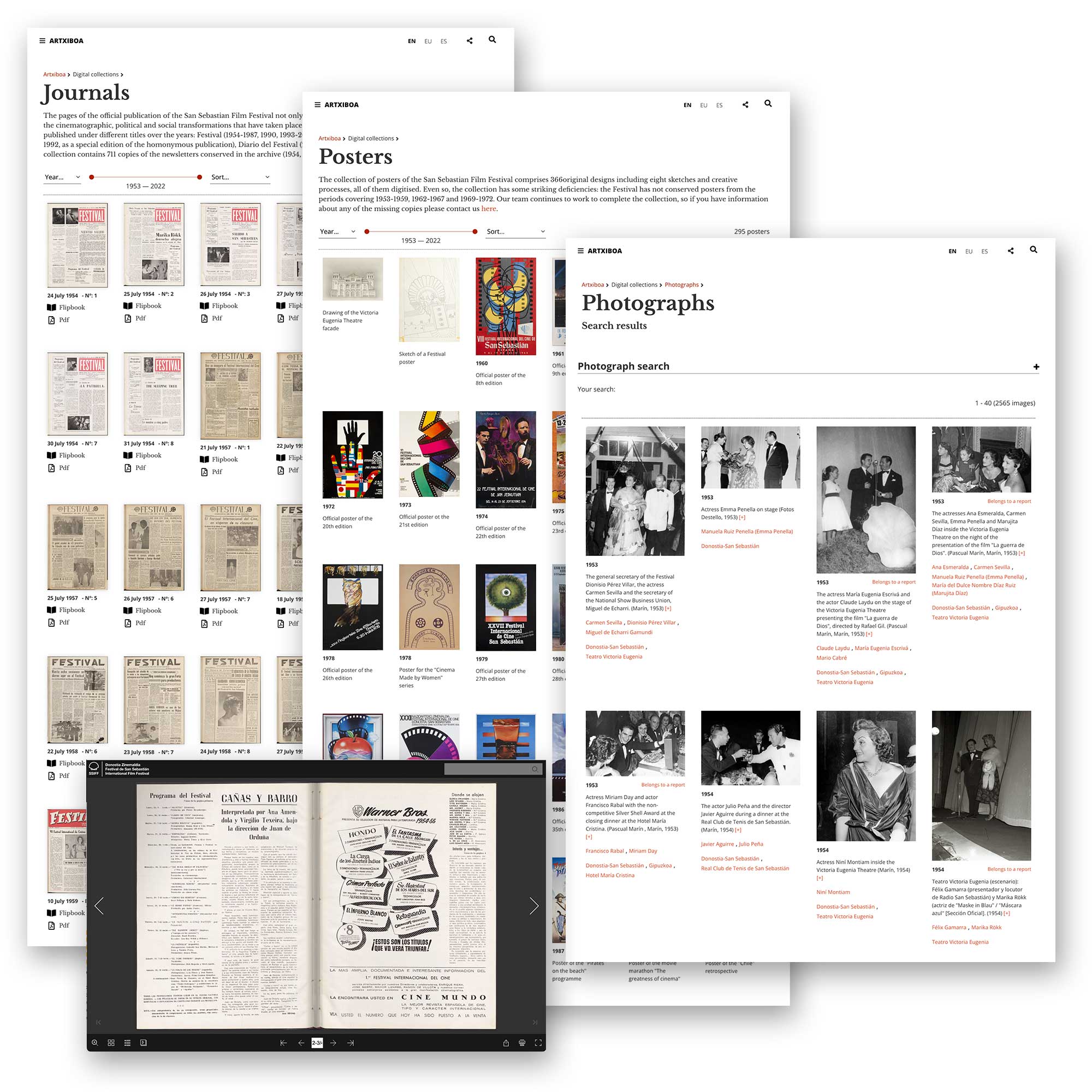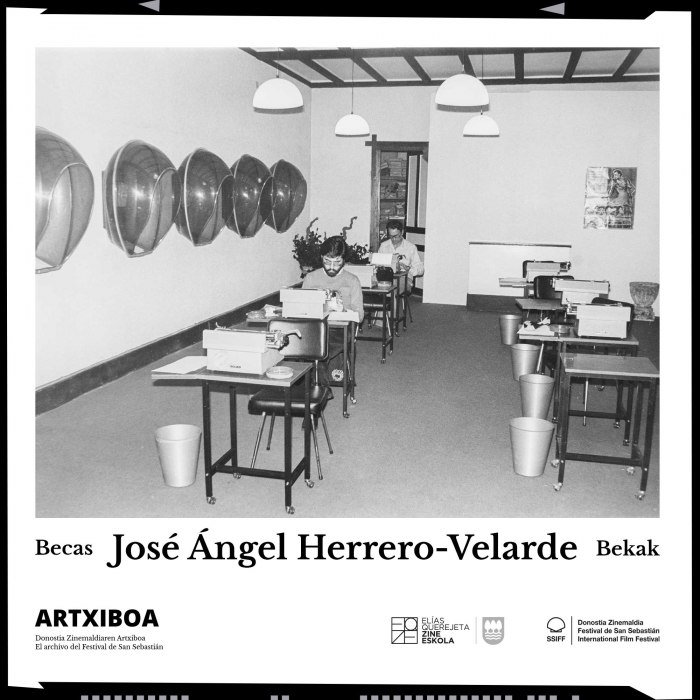The three grants promoted by the Gipuzkoa Provincial Council’s Department of Culture in the last call for submissions went to research on cinema in the sphere of socialist countries, new filmmakers and the reunion between Josefina Molina, Pilar Miró and Cecilia Bartolomé at the Festival.
The San Sebastian Festival and the Elías Querejeta Zine Eskola open a second call for submissions for the José Ángel Herrero-Velarde research grants, which join the three grants going to researchers born or living in Gipuzkoa, which have already been awarded. The two new grants are for researchers born or living in Spain.
A committee made up of members of the San Sebastian Festival and the Elías Querejeta Zine Eskola made their decision last month on the three research grants promoted by the Gipuzkoa Provincial Council’s Department of Culture. The proposals chosen by the committee were those of Felipe Cabrerizo, Endika Rey and Neus Sabaté “for the appropriate nature of their topic and methodology, their contribution at theoretical level to knowledge of national and international cinematography, and their use of the Festival archive as their primary resource”.
In his research project, the writer and programmer Felipe Cabrerizo proposes “a census, analysis and reconstruction of cinematographic production from Eastern countries which succeeded in overcoming the obstacles of Franco’s administration and were finally screened at the Festival”. Cabrerizo’s hypothesis suggests that “this cinema played an essential part in achieving the slow destruction of film censorship in Spain and served as a window onto a production completely unknown in the country since the end of the Civil War, a cinema which also advocated a fundamental aesthetic and political commitment serving to shape the new generations of filmmakers who contributed to toppling this censorship and administrative scaffolding”.
The research project of Endika Rey, professor-lecturer at the Universitat Barcelona-UB, proposes “taking a historical X-ray of the San Sebastian Festival based on its relationship with the feature films of new filmmakers”. The work suggests producing an own and alternative map based on a specific part of film history, to be created by means of identifying patterns of action in relation to the creation of a cinematographic canon, also based on the trends and tendencies present in the selection of feature films by new filmmakers included in the Festival framework.
Neus Sabaté, alumni of the first graduating class of the EQZE and teacher and pre-doctoral researcher at the Communication Studies Department of the Universitat Rovira i Virgili-URV, will address the reunion between Josefina Molina, Pilar Miró and Cecilia Bartolomé at the Festival in 1978 and proposes a study of these three pioneering women directors “not only for their origin and coincidence in the context of the Official Film School, but also for having been the first women directors in Spain to have their works screened at the San Sebastian Festival after the dictatorship. The aim of the study is to “establish whether the San Sebastian Festival was a key launchpad for the careers of Molina, Miró and Bartolomé and what importance the film festival and its closeness to and contact with some of the leading figures of the feminist cinema of the day may have had on their development as movie directors”.
New call for submissions
With respect to the new call for submissions, like in the first edition, the aim is to promote research into the Festival archive, generating new academic texts taking the Festival archive as their main source, enabling a review of the event’s past and permanent dialogue with its present and future. The ultimate goal of this edition is to produce two new academic articles to be supervised by the committee made up of the institutions participating in the programme.
This second edition of the José Ángel Herrero-Velarde grants is open to people born or living in Spain. The submission deadline for the research project will open on 3 July and run until 11 August 2023. The committee responsible for assessing and selecting the candidates will be made up of professionals from the San Sebastian Festival and the Elías Querejeta Zine Eskola. The two selected projects will be announced in October and the stay will take place from 6-17 November. Once the award has been announced, those selected will have one week to accept the grant.
The applicants must present a project indicating the subject matter, methodology and sources of the research, accompanied by a letter of intent and their curriculum vitae. Applications must be submitted to the platform of the Festival archive website, where interested parties can find the rules and all details of the call.
The research grant will earn those selected the sum of 3,500 euros. In addition, during the two weeks of access to the Archive facilities they will receive per diems corresponding to the days of consultation. The programme will also cover the travel and accommodation costs of beneficiaries who live outside Gipuzkoa and are eligible for the programme.
During the period of their stay in the Tabakalera building, home of all materials making up the Festival archive, the participants will be assigned a space for work and consultation with Internet connection in the Filmoteca Vasca. They will also have guaranteed access to the cinematic collections and archives present in and adjacent to the building and will have access to the building’s facilities, resources and activities, including film screenings, workshops and master classes.
The works, which must have between 6,000 and 10,000 words, have to be completed within seven months from the selection date, with the possibility of requesting an extension of no more than two months.
The Festival will promote publication of the projects and may function as intermediary between the researchers and prestigious publishers or journals potentially interested in publishing the projects. Said research works can also be considered by the editorial committee of the academic journal ZINE: Film Research Series jointly published by the Festival, the Elías Querejeta Zine Eskola and the Filmoteca Vasca.
The grants are named after José Ángel Herrero-Velarde Notario as a tribute to the member of the Festival’s management and selection committee, an essential figure in the last four decades of the event, who died last year.
PROJECTS SELECTED FOR THE FIRST EDITION OF THE JOSÉ ÁNGEL HERRERO-VELARDE GRANTS
- Felipe Cabrerizo: A window open to the East. Entrance to Spain of films from countries in the socialist sphere through the San Sebastian International Film Festival during the Franco era (1953-1977).
- Endika Rey: San Sebastian and the canon. New moviemakers at the Zinemaldia.
- Neus Sabaté: From the film school to the festival. The San Sebastian Festival, setting of the reunion between the three first women to graduate from the Madrid Film School: Josefina Molina, Pilar Miró and Cecilia Bartolomé.


The submission deadline for the research project will open on 3 July and run until 11 August 2023.





